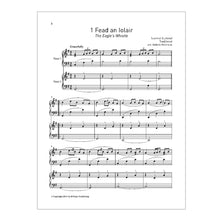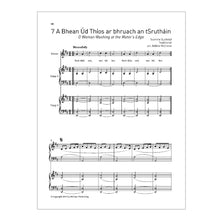This collection of lullabies and harp airs for ensemble-playing is the result of many years of friendship and collaboration. Sifting through ideas in response to the growing demand from harpers for more harp ensemble repertoire, we decided to opt for lullabies and harp airs; lullabies (suantraí or sleep music) because they are an integral part of the harp tradition in Ireland, and according to the ancient myths, one of the three gifts attributed to a harper: when he played a suantraí, everyone around him fell into a deep slumber. A lullaby is also one of the first songs that a mother will croon to her baby – hence in some cases, we have provided easily pronounceable words to vary the arrangement and to enhance melodic understanding. Each of the lullabies we have chosen is from the Irish tradition, except for one (T àladh Chríosda) from Scotland.
The three harp airs we have included are regularly played by harpers, two by Turlough Carolan celebrating his patrons, and the third, a lyrical tune heard also in the Scottish tradition, composed by the Oriel harper, Patrick McAlinden in honour of the beautiful Eibhlí.
We have indicated the atmosphere that we feel suits each arrangement, but have deliberately omitted tempi, dynamics and fingering to allow for as much personal interpretation as possible. We have tried to give some insights into the origins of the tunes with a short note on each one.
We hope you enjoy playing the arrangements as much as we have enjoyed working on them.
Helen Davies and Aibhlín McCrann







